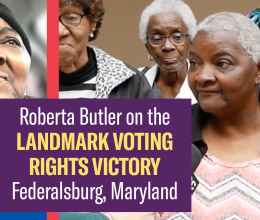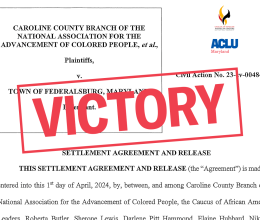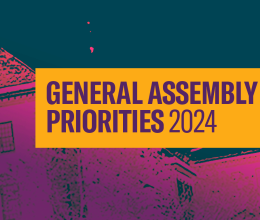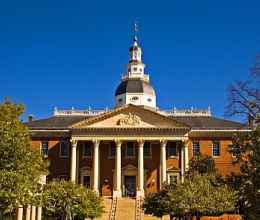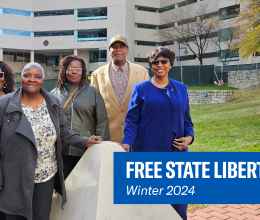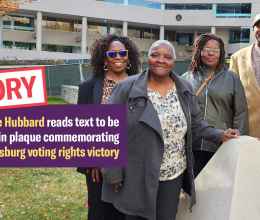
CONTACT: Meredith Curtis, ACLU of Maryland, 410-889-8555; media@aclu-md.org
Andrew D. Freeman, Brown Goldstein & Levy, 410-962-1030; adf@browngold.com
Richard A. Simpson, Wiley Rein, 202-719-7314; RSimpson@wileyrein.com
BALTIMORE - Today, the Maryland Board of Public Works reversed its refusal last month to honor a federal court judgment, and voted to approve the payment of almost $200,000 in attorneys' fees owed to civil rights plaintiffs who challenged an unconstitutional state regulation that limited First Amendment-protected activities, including voter registration, at transit stops. The amount could have been far less, but in 2010 Governor Martin O'Malley and Comptroller Peter Franchot turned down a settlement that would have paid $60,000 in fees. Following a ruling by the Fourth Circuit Court of Appeals that the plaintiffs' attorneys were entitled to reasonable fees, and a ruling by the United States District Court for the District of Maryland that almost $200,000 in fees are now due, the Governor and Comptroller in December again declined to pay the fees ordered by the court. But today they backed down and agreed to pay.
The Governor and Comptroller's refusal to approve payment of the fee award led the plaintiffs to initiate garnishment proceedings against the state's bank account in early January, and further compounded the fees due, as a result of the plaintiffs' need to spend time on a collection action. Federal District Judge Richard Bennett set a hearing on the garnishment application for February 7, in case the BPW did not reverse itself and approve the payment promptly. The Maryland Transit Authority (MTA) has also agreed to pay an additional $2,100 in fees incurred by the plaintiffs since December 19, as a result of the BPW's most recent refusal to pay the fees due.
"It is extremely unfortunate that Maryland taxpayers are being forced to pay the price of political gamesmanship by state officials," said Deborah Jeon, Legal Director for the ACLU of Maryland. "We can't put a pricetag on respect for the Constitution, but what we know here is that the price of compliance was more than three times higher than it needed to be - because the Board of Public Works refused to approve a reasonable compromise negotiated and recommended by the state's lawyers, prompting a showdown with the federal courts."
Andrew Freeman of the Baltimore law firm of Brown, Goldstein & Levy, one of the attorneys for the plaintiffs, added: "The Constitution can't enforce itself, so our laws provide that attorneys who successfully enforce constitutional rights will receive reasonable fees. In this case, it's unfortunate that, as a result of certain state officials' refusal to admit that the state had made a mistake and refusal to accept a compromise, this litigation was prolonged and the state's taxpayers now have to pay over $200,000 instead of $60,000. We are glad that the Governor and Comptroller finally came to their senses and realized that, whether or not they agree with the rulings of the federal courts, they must obey them."
In 2006 and 2007, the MTA enforced a state regulation that severely restricted First Amendment activities at MTA bus stops and subway stations against Project Vote and its volunteers, who were attempting to register voters. Represented by the ACLU and a private firm, Project Vote filed suit in 2007, seeking to prevent the MTA from enforcing that regulation. The MTA conceded that the regulation violated the First Amendment and agreed to stop enforcing it, but then resisted all efforts to rescind the law and replace it with one that met constitutional standards.
Following a lengthy delay during which the MTA failed to make good on its promises of reform, Project Vote and its volunteers returned to federal court and asked the judge to rule on the law's validity and to hold that their constitutional rights had been violated. The district court held that the challenged regulation was unconstitutional and awarded the plaintiffs the $1 each that they had sought as nominal damages. Because the MTA at that point conceded that the regulation was unconstitutional and promised not to enforce it, no formal injunction was entered.
The plaintiffs and the state, represented by the Attorney General's Office, then entered into a proposed settlement that would have paid plaintiffs $60,000 in full satisfaction of their claim for attorneys' fees. In March 2010, however, the Board of Public Works rejected that proposed settlement. Plaintiffs then filed a motion seeking $175,000 in fees and costs, but the district court denied that motion and declined to award fees.
In August 2011, the Fourth Circuit Court of Appeals unanimously reversed that ruling, emphasizing the importance of paying fees to attorneys who take on cases that vindicate important civil rights, such as the voter registration involved in this case, in order to encourage them to serve as a "private attorney general." The Court observed that "Plaintiffs successfully brought a meritorious civil rights claim to prevent the enforcement of an unconstitutional government regulation in the public interest; this is the very form of litigation Congress wished to encourage" when it enacted the civil rights attorneys' fees law.
The case was returned to the federal trial court for plaintiffs to re-submit their fee petition. On September 28, 2012, Judge Bennett ordered the state defendants to pay $192,855 in attorneys' fees and $6,642 for plaintiffs' expenses. No appeal of the ruling was taken by the state, and the judgment became final in late October.
Plaintiffs were represented on appeal by the ACLU of Maryland, Wiley Rein, LLP of Washington, and Brown, Goldstein & Levy, LLP of Baltimore.
###
